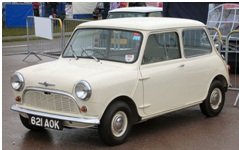|
 |
|
 |
|
|
||
Product design
Product design is... Creating a product that does its job well (function) and looks stylish (form). Function is more important than form.
Why is design important? Design can achieve product differentiation i.e. making a product better than competitors (like the Mini, pictured right above, designed by Alec Issigonis pictured right)
The 5 P’s of great design
1. Purpose (think customer) The design must give customers their required benefits better than competitors (e.g. usability, reliability, looks, style and recyclability). Market research is necessary, but it is less useful, if the product is revolutionary and unfamiliar to customers like Apple’s iPod. Ergonomics looks at how to improve a product’s usability (e.g. the comfort of airline seats) Design may be closely associated with a particular brand (e.g. the hour glass shaped Coca-Cola bottle, pictured right).
2. Persistence (enjoy failure) Keep on making prototypes until every problem is overcome and customer benefits are maximized. Failure is inevitable on the road to success.
3. Production (keep it simple) The design must make the product easy to manufacture to keep costs down. It should use existing components and production equipment as much as possible.
4. Professionalism (pursuit of excellence and teamwork) Designers must be highly skilled and passionate about their product, constantly striving for improvement, excellence and creativity. Teamwork is also essential between designers and the people responsible for making and selling the product (e.g. production, marketing and research and development).
5. Patents and secrecy New designs must be protected by a patent, and competitors must be challenged in court, if they try to copy it. Secrecy is vital in the product’s development.
Key quotes explained
“Good design keeps the user happy” - Raymond Loewy , American designer (pictured right) Good design delights customers. But it may be useless asking them what they want, if a design is so new and unfamiliar. So Alec Issigonis, the designer of Britain’s Mini car, said: “The public don’t know what they want; it’s my job to tell them”. Never copy competitors, he also advised.
“The hand that follows intellect” - Michelangelo , Italian Renaissance artist (pictured right) Thought must come before creating anything beautiful. Michelangelo’s great rival, Leonardo da Vinci, also gave some great design advice: “Simplicity is the ultimate sophistication”.
“Form and function should be one, joined in spiritual union” - Frank Lloyd Wright , American architect (pictured right) Form and function should be combined effectively to delight customers. This means balancing art with profit. “Form follows profit is the aesthetic principle of our times”, the British architect, Richard Rogers, said.
“Enjoy failure and learn from it” - James Dyson(English inventor of the bagless vacuum cleaner, pictured right) Successful design is about making mistakes and learning from them (Dyson made 5,127 prototypes of the vacuum cleaner over 15 years). Dyson's hero, Thomas Edison, the American inventor, also said: “I failed my way to success”. .
Best books
James Dyson, Against All Odds (1997) His autobiography explains the reasons for his design success:
Christopher Lorenz, The Design Dimension (1986) Design is vital to differentiating a product and beating competitors, but “skin-deep styling” isn't enough. |
|
|
||
|
|
||
| Copyright © wisdomtowin.com 2025 All Rights Reserved | ||
|











